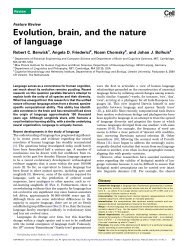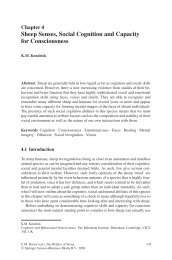Ulric Neisser
Ulric Neisser
Ulric Neisser
You also want an ePaper? Increase the reach of your titles
YUMPU automatically turns print PDFs into web optimized ePapers that Google loves.
occasions, with which later memories could later be compared. I quickly prepared an appropriate<br />
questionnaire, and later that morning distributed it to a large freshman class. Nearly three years<br />
later, when the erstwhile freshmen had become seniors, we asked those who were still at Emory<br />
to recall how they had heard about the Challenger disaster three years before. The results were<br />
astonishing. While a few subjects did remember the event fairly well, a substantial number<br />
reported highly confident memories that were nevertheless completely wrong. One, for example,<br />
recalled that "...a girl ran screaming through the dorm shouting 'the space shuttle blew up.'" The<br />
memory was vivid, but her original account showed that she had actually heard about the disaster<br />
from friends at lunch.<br />
My student Nicole Harsch and I reported this and related findings (<strong>Neisser</strong> & Harsch,<br />
1992) in the fourth Emory Symposium (Affect and Accuracy in Recall, co-edited with Gene<br />
Winograd), which also included reports of other Challenger-based studies. Our study was<br />
essentially the first to use this paradigm, i.e., getting an early account of the actual reception<br />
event ("How did you first hear the news of ...") and then testing for recall after a substantial<br />
delay. It was, however, by no means the last: every public disaster now seems to be an occasion<br />
to conduct a memory experiment. Generally speaking, most such studies of the recall of<br />
reception events have confirmed our findings<br />
Not long after Challenger, the 1989 California earthquake offered an opportunity to<br />
conduct a study that would contrast recall of reception events with recalls of direct experience.<br />
On the morning after the quake, I suggested to Steve Palmer at the University of California in<br />
Berkeley that he ask as many students as possible to record their actual earthquake experiences.<br />
A few days later, Gene Winograd contacted Mary Sue Weldon at Santa Cruz with a similar<br />
suggestion. In a third group in Atlanta, Gene and I gave Emory students the usual questionnaires<br />
about how they had heard the news. A year and a half later, subjects in all three groups were<br />
asked for recall. The contrast was sharp (<strong>Neisser</strong> et al, 1996). The subjects in both California<br />
groups recalled their (direct) experiences almost perfectly, while the Emory group produced the<br />
weak or incorrect memories typical of the (reception event) paradigm. Direct experience makes a<br />
big difference!<br />
About this time, I had one last fling with the ecological approach to perception. Several<br />
neuroscientists had recently argued that there are two distinct visual systems in the primate<br />
cortex. The dorsal "where" system controls space perception and movement, while the ventral<br />
"what" system is specialized for identification and categorization. It occurred to me that the<br />
"where" system is rather Gibsonian: it picks up information, tunes to the invariants specifying<br />
the layout of the environment, controls movement. The ventral "what" system, in contrast, is<br />
essentially an associative network. Thus Gibson and his critics were both right, but about<br />
different systems! I gave a number of talks based on this insight (including an invited address at<br />
the 1989 Cognitive Science meeting), but never felt secure enough in my mastery of<br />
neuroscience to actually publish it. Given the rapid further development of neuroscience since<br />
then, this may have been a wise decision.<br />
Self-knowledge<br />
In 1987-88 I had another sabbatical and we spent it in England, the first half in London<br />
and the second in Oxford. A Guggenheim award helped to cover expenses. This time there was<br />
no new book to work on, but I did have two enterprises in mind. One was the "what/where"<br />
hypothesis described above. The other - much more ambitious - was a new theory of selfknowledge,<br />
based in part on J.J. Gibson's insight that all perception involves self-<br />
15




